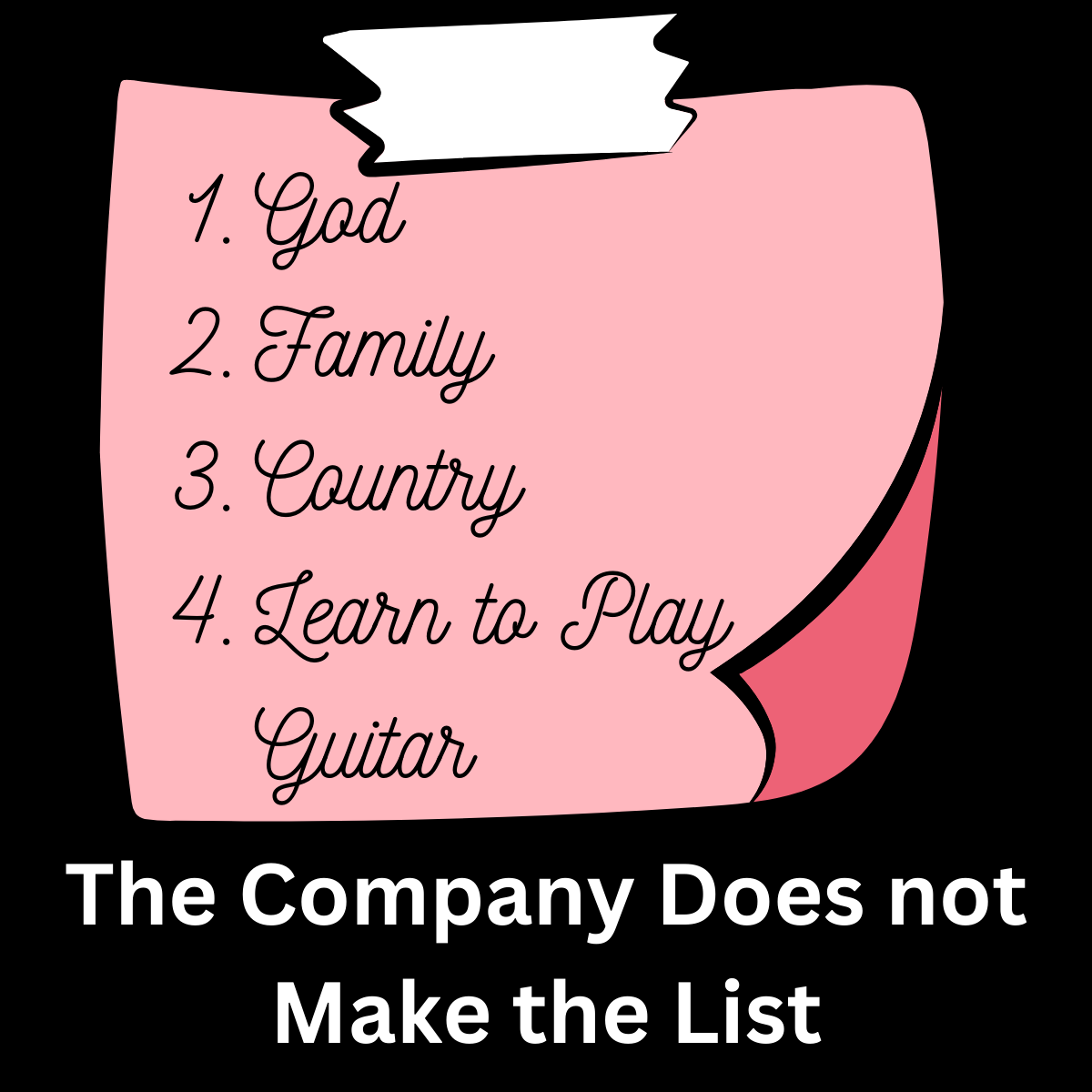Once upon a time, I was at an executive retreat for a large company. We were performing one of those exercises you would expect at a retreat. Working on our corporate values. This has always struck me as odd, companies having values, but here we were, spending the afternoon discussing and contemplating the current value statements and how we might improve them. For the most part, this exercise was worthwhile. A moment for the executives to reflect on what was important about the company’s culture and what was worth defending.
A Shocking Consensus: Company First
There was one moment, however, as several of us were gathered around a whiteboard reviewing candidate ideas that people had anonymously put next to one of the existing value statements. Our job was to rank each of these ideas and reach a consensus on which of the proposed concepts was a good candidate for a potential revision to our core values. I was shocked when the idea titled “Employees need to learn to put the company first” got the most votes from our group. The consensus was that on the list of priorities in people’s lives, they must be encouraged and motivated to always put the company first. I mumbled in my stage whisper,
“The company does not even make it on my priority list.”
This was reacted to, and I found myself defending this statement, to my astonishment. People were not proposing that employees should place the company ahead of anything in their lives. Ahead of personal ambition, ahead of family, religious faith, their desire to become a competent street musician. Ahead of all of that. I was caught off guard, so my reaction needed to be polished. I emphasized that people do not show up to a company to make it their priority; they show up because we provide them compensation, and with that compensation, they can provide for whatever their personal desires are. I was relieved to see a few nodding heads, but this was dismissed quickly, and the concept of putting the company first stayed at the top of the list.
I have spent years reflecting on this experience, and my response has become more refined. I stand by my conviction. A company has no right to ask to be on any individual’s priority list. Now, people may prioritize the company; they may have some investment, equity, or other sense of ownership. However, the idea that we should encourage or make employees feel guilty for not putting the company first is ridiculous.
A Better Idea: Aligning Goals
Create an environment where the company’s goals and an individual’s goals are in alignment. Then, you do not need to worry about motivation. When a person can achieve what they want by working for your company, you have achieved this perfection. Here is a news flash. Most people, healthy ones at least, show up and work for a company to earn compensation. They then use that compensation to fulfill their personal and family obligations, needs, and desires. That is the core motivation behind all employment. To pretend otherwise is just plain silly.
The Reality of Employment and Motivation
Unless you want to play pretend, which many of us like. I have done it myself a few times. We pretend that we can motivate and inspire people to give their whole soul to the company, get them to provide that extra amount, and put in more time and energy for which they are compensated. Yes, we can hang out in a make-believe world if we want to. It is entertaining to think that we could have that influence on our employees. However, the reality is that everyone looks at their relationship with their employer through the lens of what they are getting in return for their effort.
The True Value of Time and Compensation
Your employees may have non-monetary ambitions that the company helps fulfill, reasons that an employee will trade their time for. Those are good, too, and often, we can recognize these everyday things and ensure they are in ample supply. For example, suppose employees feel they are growing professionally through learning and experience. In that case, they will often settle for less compensation because the company provides something they could not easily obtain.
Now, if you own the company, are the founder, or are a significant shareholder, then you are in a different situation. However, if a company asks you to put them first in your life, then the price tag should be steep. Looking at my children this morning and my family, I see what we have decided is important to us. There is not a company on the planet that can afford that price tag. So I propose that we all stop pretending and instead get back to negotiating how much compensation you will trade for time. That seems to be a formula that we can all agree to. I certainly am not on board with trading any corporate value statement for my own.





I highly support guitar playing!
This is a though provoking topic, and I had to react to it.
Would it be more constructive for a company to frame this around values like excellence? Being great at what we do. Being fully invested in our pursuits… These are redeeming qualities that don’t require the sacrifice of our personal motivations, but could actually enhance them! For instance, promoting excellence translates to excellence in guitar playing, or in parenting.
Its unlikely that anyone is currently fulfilling the dreams of their childhood save it but a few (fireman, astronaut, or member of the Wiggles). Promoting values that inspire people to be great in their endeavors is worthwhile, universal, and will contribute to better company culture and outcomes.
A mission statement should even center around this idea, and express how those values benefit the recipient of the company’s efforts (customers, shareholders, stakeholders).
I think that is the point. If the company has objectives that are aligned to personal ambition, such as making a meaningful contribution to the world then you have a great situation. When the company pretends that stakeholder value is important, but really only motivated by getting as much out of people then I call into question this idea. Let’s just be honest. Shareholder value trumps. My personal values are my highest priority. The employer and the employee can meet in the middle.